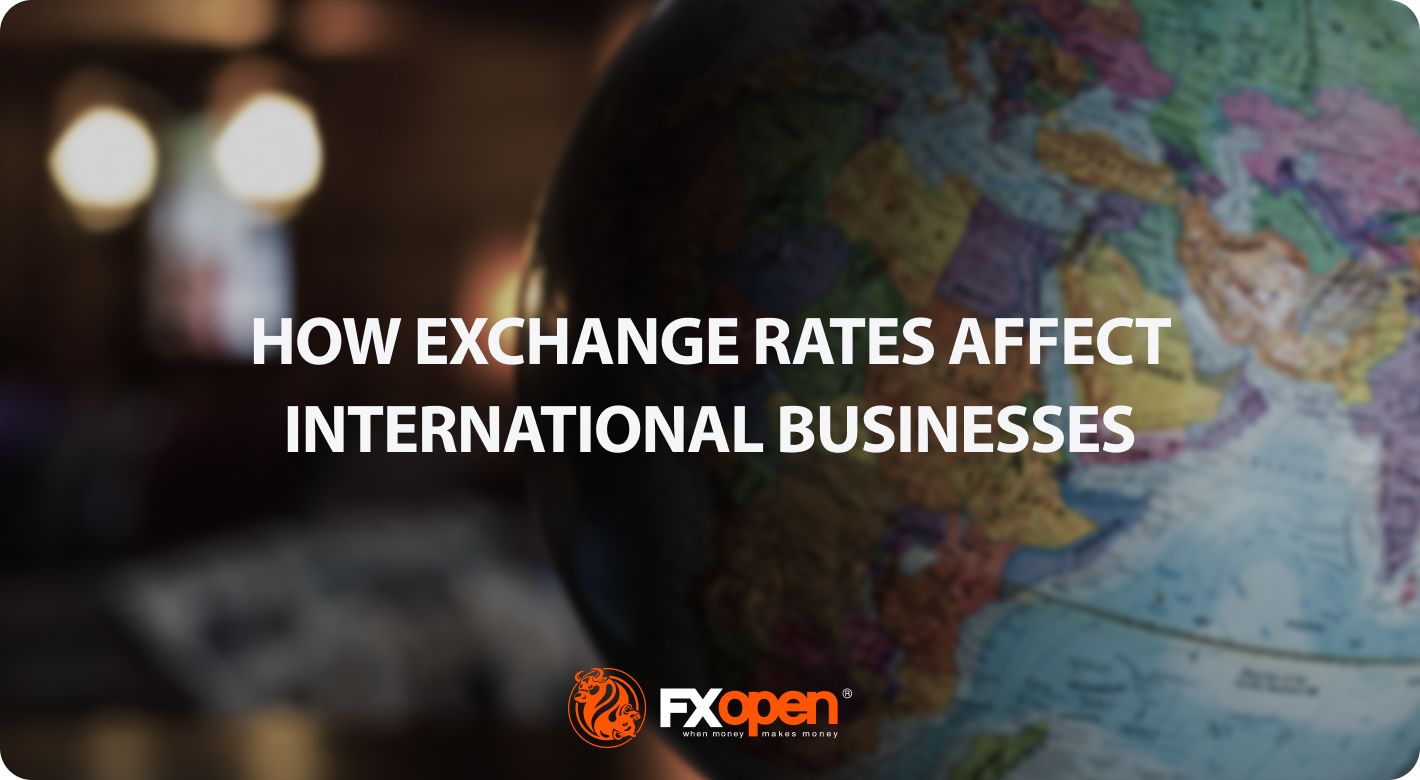FXOpen

Exchange rates directly affect the cost of goods and services in international trade and can have a substantial impact on a company’s revenue and profit margins. Foreign exchange risk refers to the potential financial impact caused by fluctuations in the value of currencies. Companies with cross-border operations are particularly sensitive to it.
This FXOpen article looks at how changes in exchange rates influence different companies in general, why they can do it, and how they affect the operations of international business.
Types of Exchange Rate Influence
In essence, foreign currency exposure is driven by the uncertainty associated with the future exchange rates of two currencies and has a material impact on a company’s financial position. To gain a deeper understanding of the impact of this risk on businesses, it’s crucial to break it down into its primary types.
Transaction Influence
Transaction influence is a risk in international business that refers to the potential gains or losses arising from the conversion of one currency into another for immediate transactions. It arises from fluctuations in exchange rates between the time a transaction is initiated and the time it is completed.
Imagine a British company invoices a European customer in euros but settles with the customer three months later. A shift in the EUR/GBP exchange rate during this period may noticeably change the final amount of funds received.
Translation Influence
Another aspect to think about is the relationship between currency risk and businesses that have subsidiaries in other countries. Translation influence, also known as accounting risk, primarily affects multinational corporations with affiliates operating in different currencies.
It arises when these companies consolidate their financial statements by translating foreign currency assets and liabilities into the reporting currency. Fluctuations in exchange rates can lead to changes in reported earnings, which creates challenges for financial analysis and decision-making.
Economic Influence
Considering a more global risk, it’s vital to pay attention to the economy as a whole. The economic impact is long-term and can change a company’s overall competitiveness and value. It affects a company’s international investments and may influence its strategic decisions.
For instance, the economic landscape can affect the relative prices of a company’s products or services. Thus, manufacturing in one country and selling in another may become unprofitable, and the company will have to find new markets.
Factors Contributing to Exchange Rate Changes
To better understand the foreign exchange risk in international business, let’s start with an examination of the factors that contribute to it. Three main areas to keep in mind are market movements, economic conditions, and political stability.
Exchange Rate Volatility
Exchange rate volatility is a foreign exchange market risk. You can track currency changes by looking at the movement of currency pair quotes on international exchanges and special platforms like TickTrader. Market players, namely large companies, banks, institutional investors, and traders, influence the quotes by their actions. When exchange rates are highly volatile, companies face greater uncertainty about the future. This may hinder forecasting and managing cash flows.
Macroeconomic Factors
Macroeconomic factors such as interest rates, inflation, and economic growth are something that multinational companies need to keep an eye on. Changes in these factors lead to shifts in the value of currencies, directly affecting international businesses engaged in trade and investment. To keep abreast of global and local economic news, you can gather information from a variety of reputable sources and regularly check the economic calendar.
Political Instability
Political instability in a country can disrupt the stability of its currency. Sudden changes in government, politics, or geopolitical events can lead to fluctuations in the value of currencies, creating a corporate risk for companies operating in these regions. To keep up with developments, traders may read the news regularly and use the Political Stability Index. It is one of the indices developed by the World Bank, and it measures perceptions of the likelihood of the destabilisation of the incumbent government.
Impact of Exchange Rate on International Businesses
Now that we’ve explored the nature and contributing factors of the exchange rate effect, let’s examine how it can affect international businesses across various dimensions.
Financial Implications
Revenue and profit fluctuations. Foreign exchange rates can affect a company’s revenue and profits. Fluctuations lead to unpredictable shifts in the value of international sales and could enhance or worsen a company’s financial performance.
Cash flow challenges. Cash flow management becomes more complex. Currency fluctuations can impede predicting the timing and amount of incoming and outgoing payments. This often results in cash deficits or surpluses, making it harder to meet financial obligations.
Operational Disruptions
Pricing and cost issues. Another business risk of a company is that currency fluctuations may disrupt pricing strategies. It may be necessary to adjust prices frequently, which will negatively impact competitiveness and customer relations. In addition, changes in the cost of imported materials may increase the cost of production.
Supply chain disruptions. International companies typically rely on complex global supply chains. Disruptions will affect the cost of imports and make it difficult to manage contracts with international suppliers, potentially leading to delays.
Strategic Considerations
Expansion decisions. Exchange rates can influence a company’s decisions to enter a new market and expand operations. Perceived influences related to certain currencies or regions can deter or encourage expansion plans.
Mergers and acquisitions. Companies should assess how currency fluctuations change the value of target companies. This is important since the results of the assessment will show the potential success and profitability of a merger or an acquisition.
Final Thoughts
Understanding the types of exchange rate effects, the factors contributing to them, and the potential impact on financial and operational performance is critical to effective management. Adopting sound strategies to mitigate the effects of currency fluctuations will enable companies to thrive in the global market.
If you are interested in participating in global markets, you can open an FXOpen account and start trading. We offer forex pair and stock, index, ETF, crypto*, and commodity CFDs, so you can easily diversify your portfolio and minimise the business risk of your company related to exchange rates.
*At FXOpen UK and FXOpen AU, Cryptocurrency CFDs are only available for trading by those clients categorised as Professional clients under FCA Rules and Professional clients under ASIC Rules, respectively. They are not available for trading by Retail clients.
This article represents the opinion of the Companies operating under the FXOpen brand only. It is not to be construed as an offer, solicitation, or recommendation with respect to products and services provided by the Companies operating under the FXOpen brand, nor is it to be considered financial advice.
Stay ahead of the market!
Subscribe now to our mailing list and receive the latest market news and insights delivered directly to your inbox.









